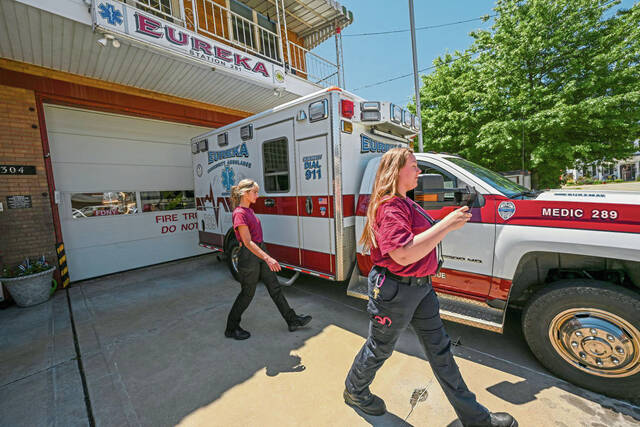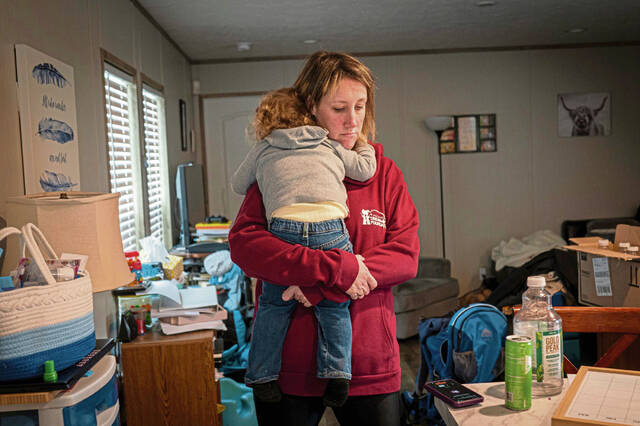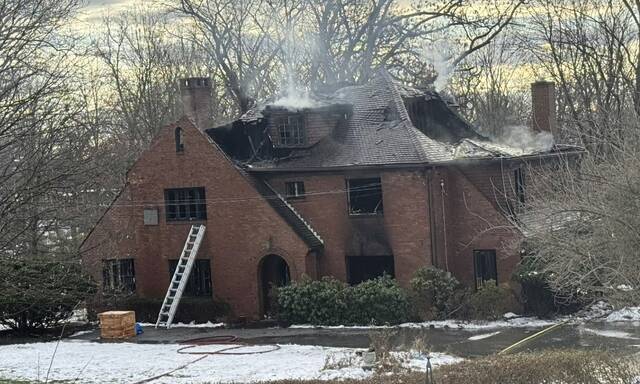Eureka Community Ambulance Service in Tarentum is placing its own call to 911.
Leaders said Thursday the 88-year-old emergency response service likely will close or significantly curtail operations by January, barring crucial and consistent funding from local, state and federal sources.
“When we provide a $900 ambulance service and get back $52 from insurance,” Chief Brad James said, “there’s no way to sustain that.
“The future doesn’t look bright. The question is, ‘How long do we want to try to struggle?’ ”
Eureka’s plight is not unfamiliar. More than a dozen agencies across the state have closed in recent months, including Seneca Area in Indiana Township, which closed in January after 28 years, and Jeannette EMS, which operated for 63 years.
It all comes down to money.
James said insufficient municipal support and rock-bottom insurance reimbursements could mean closing the EMS, which serves Tarentum, Brackenridge, East Deer, Fawn and Frazer. The municipalities have a combined population of more than 12,000.
“Insurance companies are reaping the benefits that should be directed to EMS,” he said. “And we get no specific funding for EMS from any of the municipalities.”
James noted Fawn has pledged a line item in the township’s 2025 budget, though the amount is not clear. Tarentum and Brackenridge officials are discussing solutions.
Frazer Supervisor Bill Creevey was surprised to learn the news.
“We will definitely have to look into it,” he said. “The whole community is going to have to find out, if Eureka can’t survive, what would we do.”
In Pennsylvania, municipalities are required to ensure the provision of EMS services whether through paid staff, volunteers, contracted services or other arrangements.
Tarentum Manager Dwight Boddorf said the mandate underscores the importance of every municipality’s role.
“Tarentum provides support to Eureka through direct donations, free housing, covering electric costs and other forms of assistance,” Boddorf said. “Despite these efforts, Eureka serves five municipalities. Tarentum Council believes that our residents and business owners should not be the sole contributors to funding EMS services in the region without consistent support from the other municipalities.
“We will continue to support EMS and all first responders, but other communities must pay their fair share for those services to be viable.”
Tarentum officials are in the early phases of proposing an ambulance authority. It would act similarly to a taxing or billing body and distribute costs of EMS services among the five municipalities.
James appreciates the efforts but said there are overriding concerns that people won’t pay the fee.
“We voluntarily ask now through our subscription drive, and the return is pitiful,” he said. “It’s about 18%.”
From residents of the five communities, Eureka receives about $41,000 in donations.
Their budget is $110,000 — not including payroll for its 14 staff members.
“That means that 80% of our service area is not supporting us,” he said.
Heather Sharar, executive director of the Ambulance Association of Pennsylvania, said a $20.7 million medical assistance increase was approved by the Legislature in January, but it didn’t go into effect until May.
“The reimbursement from any insurer is based on providing a service and does not provide the needed funding for the cost of readiness or to be in service 24/7,” Sharar said. “Most reimbursements are below the cost to provide the service.
“Local municipal entities need to start to financially support EMS. If things do not change, you will see more services close.”
James said there has been talk for years about more funding, and it has raised awareness but not actual dollars.
“The time to wake up was a long time ago,” he said.
He urged residents and business owners to attend upcoming municipal meetings to lobby for an EMS tax, ambulance authority or consistent municipal funding.
“Nobody wants to hear about raising taxes, I know that. But between local and state governments, there needs to be a funding stream,” James said.
State Rep. Mandy Steele, whose 33rd Legislative District includes Tarentum, said the EMS crisis statewide is being “felt locally in a big way.”
“Imagine that no ambulance comes when a family member is in a terrible car accident or has a heart attack. We absolutely cannot have people die because of lack of emergency management services,” Steele said.
The issue needs to be addressed through a collaborative of local, county and state agencies, she said.
“Using tax dollars to adequately fund first responders is one of the best investments we can make in public safety,” she said.
There’s no mistake that closing Eureka — which responded to more than 2,300 calls last year — would create a hazard, she said.
“There’s already not enough trucks and staff across the region,” James said. “Closing would directly affect response times and stretch thinner an already thin system.
“It should not be our problem to figure out how to survive.”











